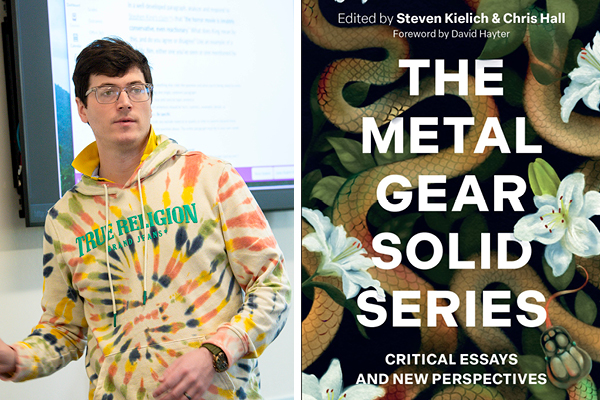
In February, Dr. Chris Hall, assistant professor of English at University of the Ozarks, published a volume of scholarly essays studying the critically and commercially acclaimed Metal Gear Solid video game series, titled The Metal Gear Solid Series: Critical Essays and New Perspectives.
The book, which Hall co-edited with Steven Kielich (University of Rochester), was published by Bloomsbury Academic, and features chapters from scholars around the world that analyze politics, pedagogy, rhetoric, ecology, gender, and much more as they arise in the series. Hall and Kielich also co-wrote the volume’s Introduction chapter.
Research leading up to the book’s development has guided Hall’s recent teaching and publications, including his Fall 2024 course on Video Game Studies, and a separate co-authored article on the series for the major game studies journal Games and Culture in 2024, titled “‘As if Possessed by a Demon’: Subjectivity, Possession, and Undeadness in Metal Gear Solid,” available here: https://doi.org/10.1177/15554120241226828.
Hall’s Video Game Studies class was constructed around weekly collaborative in-class play together sessions of multiple games in the Metal Gear Solid series, as well as a wide range of other games. These sessions built upon weekly thematic units and readings in the history, economics, genres, and politics of videogames, leading up to a student-led podcast project to conclude the semester.
This edited collection arrives in the wake of the 25th anniversary of Metal Gear Solid’s 1998 release for the Sony PlayStation, providing scholars, fans, and students with a wide-ranging selection of critical essays on the franchise from diverse disciplinary and thematic perspectives.
“With the official conclusion of Hideo Kojima’s Metal Gear Solid video game series with 2015’s Metal Gear Solid V: The Phantom Pain, and the remake Metal Gear Solid Delta releasing later this year, it’s a great time to be a scholar and fan of the series and to study this critically, commercially, and culturally resonant series as a whole,” Hall said. “The essays contained in this volume, which are all brand new contributions from both established and emerging scholars, take up this opportunity to consider and reconsider the cultural, historical, political, philosophical, and aesthetic impact of the Metal Gear Solid games in analyses spanning the series’ canonical entries, adding to the understanding of both well-studied installments and under-examined ones.”
“These contributions connect themes that emerge from the games—such as sexuality and queerness, rhetoric and ethics, and subjectivity and embodiment—while also demonstrating how the series opens up broader questions about environmentalism, race, gender, militarization, pedagogy, and game design, that demand continued analysis and application. Each essay develops new avenues for theoretical, rhetorical, and political exploration of the Metal Gear Solid series, for game studies, and for the study of popular culture. As the first collection of critical inquiries into the Metal Gear Solid series, this volume serves as crucial exegesis of and critical companion to any future study of the series by celebrating, critiquing, and critically interrogating its entries’ rich cultural and disciplinary import.”
More information about the book and its table of contents are available on Bloomsbury’s website, at: https://www.bloomsbury.com/us/metal-gear-solid-series-9798765123577/.
Topics: Faculty Spotlights
